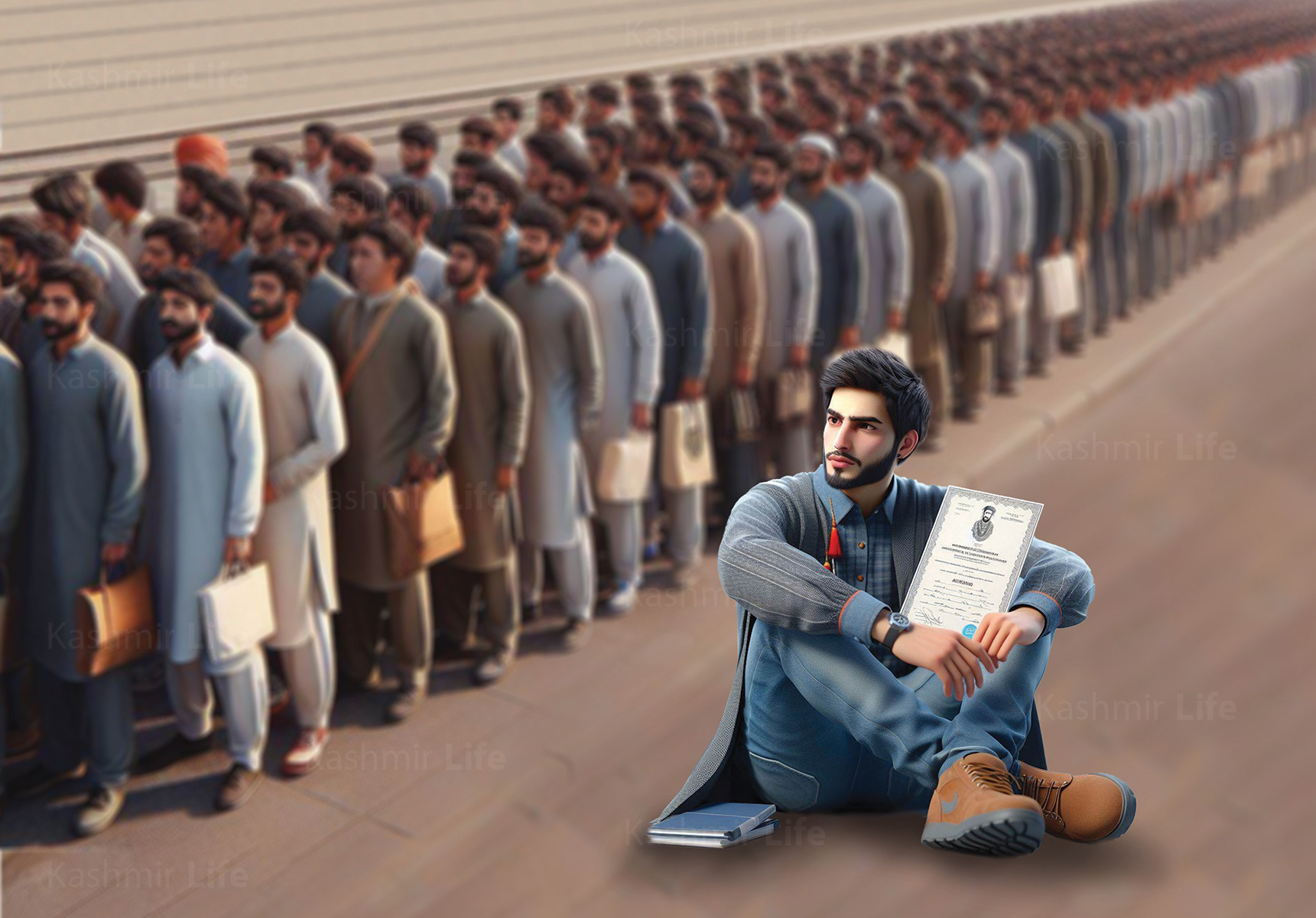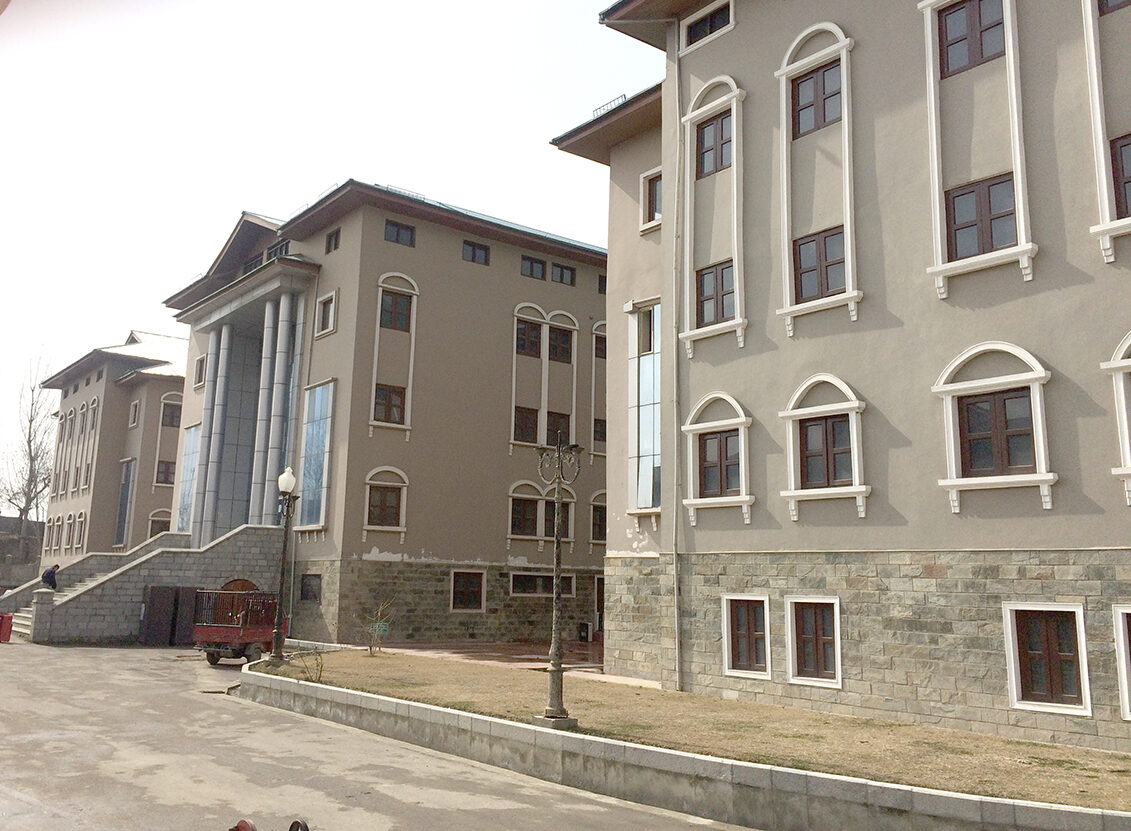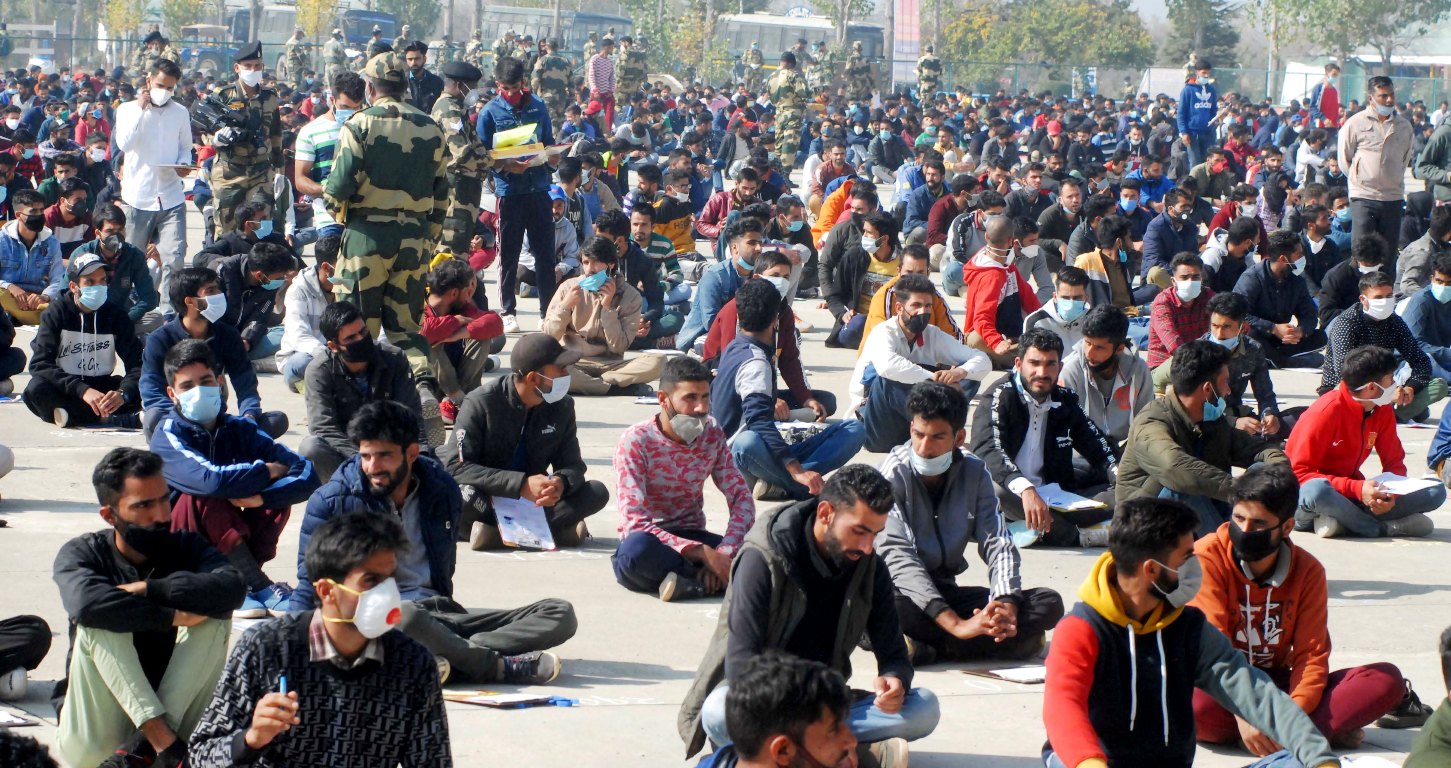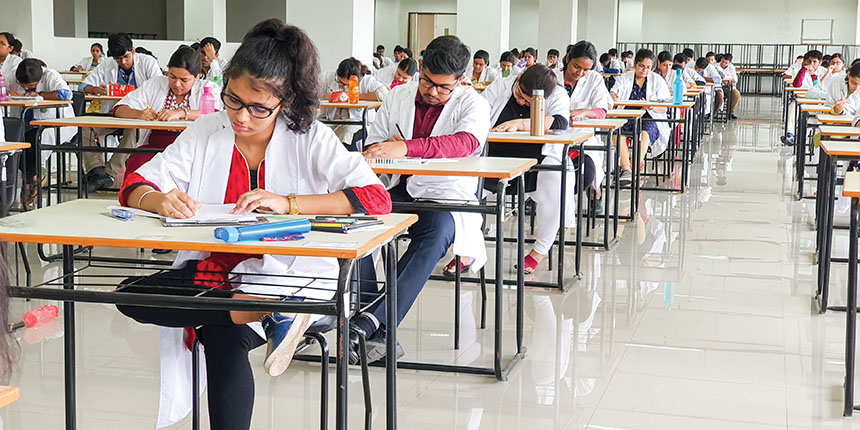As the government in Jammu and Kashmir has started recruiting its staff, the selection lists exhibit a skewed regional balance. Syed Shadab Ali Gilani investigated the trend only to find out that new-generation Kashmir has stopped competing because they avoid serious studies, claim a lack of enabling infrastructure and are unwilling to spend years in preparations

After a long hiatus when the Jammu and Kashmir government’s recruiting agencies finally started issuing selection lists of the candidates for various positions, it started shocking people in Kashmir. They felt that Kashmir was being pushed towards under-representation. Kashmir, after all, is one of the places having the highest unemployment rates, especially after the last few years.
In the 2023 JKAS list issued on April 25, 2023, 177 selections were made of whom 143 were from Jammu province and 34 were from Kashmir.
The JKAS list was issued on January 25, 2024, and a total of 209 selections were made. These included 153 from Jammu and 56 from Kashmir.
In the list of Prosecuting Officers issued on February 5, 2024, 116 selections were made – 86 were from Jammu province and 30 from Kashmir.
On February 21, 2024, the list of Junior Engineers was released. A total of 855 selections were made – 557 were from Kashmir and 298 from Jammu.
In the Accounting Assistant’s selection, of the 855 candidates selected 391 were from Kashmir.
January 8, 2024, selection list of sub-inspector for Jammu and Kashmir Police, out of 1200 only 199 were from Kashmir.
There were only 48 candidates from Kashmir from 208 called for interview by the Jammu and Kashmir Public Selection Commission for KCS judicial.
Job shares as per the demographic composition of Jammu and Kashmir has remained an old slogan but it is now fading away. Almost half of the jobs are already reserved for different categories leaving the open merit to a huge population of unemployed thus pushing the level of competition too high. As going gets tough, it gets very cooler for the job aspirants from Kashmir.
A general impression would tend to suggest as if it is being done deliberately. However, systems in place and transparency in the process prevent such a possibility. Stakeholders and the people who are in the know of things insist that the Kashmir youth have given up and are unwilling to get into the “rat race” of competition.
Why has it been in vogue for many years and what are the reasons behind it is an interesting study. Dr Monisa Qadri, Senior Assistant Professor at the Islamic University of Science and Technology (IUST) is concerned over the fragmented approach towards the traditional structure of the current educational system. She believes it is not preparing students for future careers, particularly in competitive civil services. She attributes this to inadequate career counselling, limited resources, and information gaps, leaving students feeling ill-equipped.
In agreement, Syed Shahnawaz Bukhari, an officer who is also involved in career counselling and coaching for civil services emphasised the enduring appeal of government jobs. “Even individuals with advanced degrees like MTech prefer low-paid government roles over specialised positions in the private sector,” he observed, reiterating societal respect for bureaucratic positions.

Regarding regional trends in civil services examination participation, Bukhari noted that Jammu does better than Kashmir. “In these examinations, Kashmiri candidates are outnumbered by those from Jammu, typically at a ratio of one-third to two-thirds,” he said.
In Jammu, various factors such as caste, region, and religion also influence civil services examination participation. Poonch and Rajouri districts have a significant Schedule Tribe (ST) representation.
Discussing these issues, Tariq Ahmad Chalkoo, Head of the Department of Physics at Government Degree College Baramulla, revealed another major factor influencing participation. “This year, almost 40 per cent of students were absent from one examination,” he pointed out. “Only 55 or 60 per cent appeared from Kashmir and others. So how do you expect that they will be on the final list? So, Kashmir cannot make it to the level which we expect.”
Competitive Exams
According to Nasir, a civil services aspirant, the main challenge lies in the syllabus structure. “The prescribed syllabus is too vast and intermingled,” he remarked. “Arts students not only have to study their subjects but also CSAT and science. Similarly, science students have to study arts subjects, which puts candidates at a disadvantage. Moreover, job opportunities are not specific to particular sectors; for example, positions like accounts assistant are open to all streams, whereas they should ideally be reserved for commerce students.”
“Jobs here merely require passing exams without any focus on skill-based assessments,” Nasir insisted. “To increase the number of successful candidates, our education system must prioritise skill training, necessitating a change in the current system.”
Another aspirant, Nazim, an engineering graduate from Srinagar, highlighted the lack of exposure and practical knowledge among students in Kashmir. “Students here focus solely on theoretical knowledge and lack practical experience,” he noted. “Teachers prioritise theoretical concepts, resulting in students lacking confidence and exposure when entering the workforce.”
Besides, he pointed out that many successful candidates in government engineering exams studied outside Kashmir, indicating a deficiency in local colleges.
Chalkoo addressed the mindset required for writing a job exam. “The motivation level cannot come from teaching alone. It has to come from within.” He observed a prevalent attention deficit among students, possibly influenced by excessive technology use. “Everyone with a mobile phone is suffering from this attention deficit problem,” he remarked. “They may find classroom engagement less satisfying compared to the stimulation provided by digital devices, leading to a tendency to avoid classes.”
Not Interested
Following the completion of her bachelor’s degree in arts at a college in Srinagar, Shireen, 24, from South Kashmir Anantnag, was urged by her parents to take the examination for the post of Panchayat Assistant.
“I was doomed, I had not studied anything and there was this pressure to appear in the examination, to get a hold of how these exams work,” Shireen stated. “But I was not ready; I knew I would not be able to qualify.”
Shireen’s father provided her with books and study materials for the examination. “Everything written in the books looked alien to me. Everything that I had studied during my graduation looked useless to me and I was like what am I even doing? Everything went over my head.”

On the day she was supposed to write her examination, Shireen was surprised to find that everyone at the venue was older than her. “Some of them even were appearing in the exams after rigorous preparations for many years. For some, it was their third or fourth attempt with the SSB examinations.”
Expectantly, Shireen failed to qualify. “The biggest reason for me was the lack of interest and the type of questions. I mean why was I solving mathematics riddles when I did not study maths for five years? It was the first and last time that I appeared in an examination for a government job.”
Unrealised Aspirations
Bukhari offers insights into the influential role of parental guidance on a child’s educational path. “A parent, even if interested in a certain career for their child, should not impose it upon them,” Bukhari asserts, reflecting the sentiments of many young individuals grappling with the complexities of ambition and familial expectations.
Bukhari identifies a significant gap in the current system: the absence of proper counselling centres within schools. “It is the appropriate age for a child to explore their areas of interest,” he remarks, stressing the need to address this deficiency urgently.
The repercussions of neglecting this aspect extend through generations. “Their area of interest might be ‘A’, but it goes unrecognised, and they are pressured into pursuing a profession in ‘B’,” Bukhari laments, illustrating the consequences of unrealised aspirations and unfulfilled potential.
The misalignment in career choices results in a skewed talent distribution. “Maybe that is why we have more students ending up pursuing medicine, often under social pressure, while they would have pursued something of their own choice and based on their abilities,” he noted, drawing attention to the disproportionate emphasis on medicine driven by societal pressures.
“There are so many distractions in their lives that they are becoming dumber day by day,” Hudaiba, a PhD scholar, commented on the declining clarity among Kashmiri youth regarding career paths. “And most people lack clarity about what to do. They fill out whatever forms are available. First, they take medical exams, then they pursue a Bachelor’s in Business Administration (BBA), and suddenly they start preparing for the Union Public Service Commission (UPSC). If they hear about any exam, they fill out the form and go to take the exam without any preparation.”
Reflecting on collegiate challenges, Bukhari highlights the harsh realities faced by those deviating from conventional paths. “When engineering or medical pursuits falter in college, the individual is left stranded,” he observes, emphasising the need for a more nuanced approach to failure and redirection. “Now, well-educated parents appreciate the value of studies in humanities.”
Competitive Opportunities
Chalkoo, Head of the Department of Physics at Government Degree College Baramulla, emphasised the detachment between academia and job profiles in institutions. “Higher education is not directly correlated with job opportunities due to the distinct requirements of job examinations.” He pointed out a prevailing local mindset that limits perspectives and narrows aspirations. “People have become accustomed to a localised approach, neglecting the need for broader national and international competitiveness,” he asserted.

Chalkoo highlighted the necessity of preparing individuals for national and international competition. To bridge this gap, he referenced initiatives such as a Trust focused on grooming youth for civil services. “We endeavour to equip young minds for civil services,” he noted, underlining grassroots efforts to empower the upcoming generation. However, he acknowledged regional disparities in accessing such opportunities, particularly in administrative services.
In addressing the issue, Chalkoo criticised the tendency among some academics and social influencers to publicly disparage civil servants, reducing their roles to mere “glorified clerks.”
The failure of some academicians to inspire curiosity in their students emerges as a significant concern, noted Bukhari, reflecting widespread frustrations among learners.
Bukhari remains optimistic about the potential for research and innovation within academic settings. “There is ample scope on the research front,” he observes, accentuating opportunities for advancement and exploration.
Expressing dissatisfaction with prevailing assessment methods, Bukhari critiques the practice of awarding full marks, illuminating its contribution to a culture of perfectionism and unrealistic expectations.
Chalkoo, also serving as the Divisional Coordinator of Career Counselling, emphasises the need to support those actively seeking competitive opportunities. “Facilitating the 10-15 per cent of students striving for higher learning institutions is crucial,” he acknowledges.
Aqib, a scholar and aspirant, stated, “In my opinion, the first major reason is the lack of professional guidance and the lack of understanding of the nature of the paper.” He further noted that students often study independently without understanding the exam syllabus and demands, leading to uniformity in preparation across all exams. “Another factor is the overemphasis on memorising facts and figures rather than understanding conceptual notions. This goes back to the modus operandi that we have in our schools.”
The Library Culture
A quiet transformation is unfolding in Jammu and Kashmir, marked by the emergence of study centres and libraries across the region. Shahnawaz Bukhari succinctly captures its significance, stating, “We need to recognise our societal shortcomings in light of this development.”
In Jammu, the Sunjawan-Bathandi area hosts numerous study hubs, serving as havens for knowledge and education. Bukhari, speaking from personal observation, proudly confirms this. “I have seen it myself.” Yet, this trend extends beyond specific locales, reaching every corner of the region. Bukhari explains, “You can find study centres in every neighbourhood.”
The origins of this cultural shift tell a story of necessity and innovation. “How did this culture develop in Jammu and Kashmir?” he points out. The answer lies in the cramped living conditions of Srinagar, where creating a personal study space is challenging. “People have 1 BHK, 2 BHK. They do not have space to study separately,” laments Saima, a Srinagar resident preparing for the upcoming JKSSB exams. Thus, the emergence of study centres equipped with libraries and high-speed internet offers sanctuary for ambitious minds.
According to Mustaqeem, several factors contribute to the challenges faced by Kashmiris in qualifying for government jobs or competitive exams. “The region’s history of instability disrupts educational institutions, limiting access to quality education,” he explains. “Limited economic opportunities often steer young people toward unskilled jobs rather than higher education. Psychological stress from the political situation may also affect students’ focus, while connectivity issues hinder access to online resources crucial for exam preparation.”
Moreover, Mustaqeem highlights additional challenges.“Lack of infrastructure, including inadequate libraries and coaching centres, hampers the learning process,” she says. “Language barriers, with many exams conducted in languages other than Kashmiri or Urdu, pose an extra hurdle for Kashmiri candidates.” High unemployment rates in the region intensify pressure on individuals to succeed in these exams, leading to heightened anxiety and stress.
Bukhari further explores the educational landscape, noting, “There are only a few libraries, like the ones in Batamaloo and Karan Nagar, that I know of.” Yet, these libraries mainly serve students preparing for competitive exams such as the National Eligibility Entrance Test (NEET), emphasizing the need for greater accessibility and inclusivity in educational resources.
Bukhari’s Initiative for Competition Promotion (ICP) is working to get the new generation ready for competitive examinations. There, they offer a year-long immersive experience aimed at nurturing young talent. “We keep them in-house for a whole year. We do not just teach them; we groom them,” he said. The focus is on creating an environment conducive to holistic growth, where study discussions become a part of daily life.
Reflecting on the transformative potential of such initiatives, Bukhari envisions libraries transcending their traditional role. “This library culture has to be 24×7,” he asserts, focusing on the need for flexible learning environments tailored to modern student lifestyles.
The Quest for Libraries
Chalkoo emphasised the necessity for accessible services beyond institutional settings. “We need to have those places where there is a 24 x 7 kind of service, which is going to be a conducive service towards enhancing the readership, enhancing the instinct for competition and facilitating those who are willing to do so. That thing is still lacking.”
He envisions the places of worship and prayer serving as locations where students study at the Mohalla level or Waqf board-created facilities. “It doesn’t necessarily require a large room; even a small one would suffice, and the community could handle the arrangements.”
Bukhari, sharing his vision, expressed the aspiration for libraries bustling with activity around the clock. “Creating a conducive environment where we can have a library running for 24 hours is the goal. I hope now is the time,” he said.
Contemplating his students’ needs, particularly those pursuing civil service aspirations, he remarked, “I hope some of them only open up a good library where they can study at night and have facilities,” demonstrating his steadfast commitment to their success.
Closing Reflections
Encouraging exploration, Bukhari invites visitors to discover the stories of resilience within his hostel. “You have to visit them sometimes,” inviting the people of Srinagar to witness the struggles and triumphs of its students. He said Mathematics is one of the weakest subjects. “Students say we are very weak in this too. We are very behind in Mathematics.”
Providing insight, Bukhari discusses the hurdles aspirants encounter, particularly in aptitude tests. “A good number of them fail because of the aptitude test. Where they are not able to take even 33 per cent,” he reveals, emphasising the importance of rigorous preparation.
Despite obstacles, Bukhari notes the increasing competition in Jammu and Kashmir, calling attention to the growing participation of students from diverse backgrounds in the pursuit of excellence.
Bukhari’s optimism remains undimmed, accenting the increasing interest in civil services among students from the old town of Srinagar. “The children from old town Srinagar are coming now and opting for civil services,” he observes, applauding the growing enthusiasm.
However, challenges persist, with the prevailing security situation casting a shadow over educational endeavours. “Honestly, it was a depressing situation here that has affected our collective psyche,” Bukhari acknowledges, recognising the widespread impact of instability on educational pursuits.















